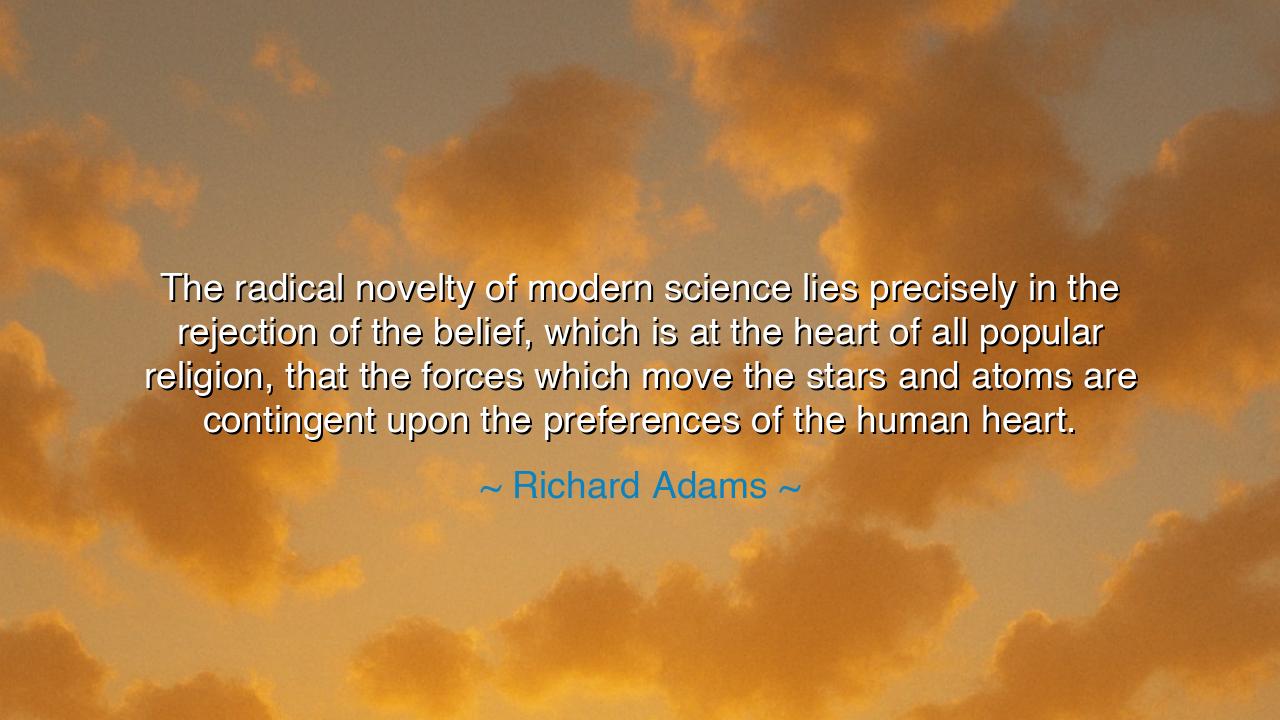
The radical novelty of modern science lies precisely in the
The radical novelty of modern science lies precisely in the rejection of the belief, which is at the heart of all popular religion, that the forces which move the stars and atoms are contingent upon the preferences of the human heart.






Hear, O seekers of truth, the words of Richard Adams, who declared: “The radical novelty of modern science lies precisely in the rejection of the belief, which is at the heart of all popular religion, that the forces which move the stars and atoms are contingent upon the preferences of the human heart.” In these words is a turning point in the history of thought, a line drawn between the age of myth and the age of reason. He speaks of a revolution in human understanding: that the cosmos does not bend to our desires, nor do the laws of nature shift for the sake of our prayers. The universe moves according to its own order, vast and impartial, indifferent to the loves and fears of men.
The origin of this insight lies in the dawn of the scientific age, when men like Copernicus, Galileo, and Newton shattered the belief that the heavens revolved around human longing. Before this age, the stars were seen as omens, their movements reflecting the will of the gods or the fate of mortals. The thunder was divine anger, the eclipse a celestial warning. But with the rise of modern science, the veil was torn away: the stars are governed by gravity, the thunder by pressure and air, the eclipse by the dance of the spheres. Thus, Adams names this the “radical novelty”—that man is not the center, but only a part of a vast and unfeeling order.
Consider how profound this shift was. For countless generations, men imagined that the cosmos cared for them, that their offerings and rituals could stir the heavens, that their emotions could alter the laws of nature. But science revealed otherwise: the apple falls not because of human sin, nor does lightning strike because of human pride. These forces are eternal, impartial, unmoved by the passions of the heart. To accept this was at once humbling and liberating. It stripped man of his imagined centrality, but it gave him knowledge that could heal, build, and transform the world.
History bears witness in the story of Galileo Galilei. When he looked through his telescope and saw the moons of Jupiter, he declared that not all bodies circled the Earth. For this, he was condemned, for his discovery challenged the ancient belief that the universe revolved around man. Yet Galileo’s truth endured, and from it flowed the recognition that the stars obeyed laws indifferent to us. Though his heart longed for approval and safety, the heavens moved according to their own order. Here was the essence of Adams’ words: the stars do not heed the human heart—they follow the eternal laws of nature.
But let us not mistake this truth for despair. If the universe is indifferent, still it is intelligible. If the atoms do not move for us, still we may learn their dance. And in this learning lies our greatness—not that the world bends to our will, but that our minds, humble and persistent, can discern the laws that govern it. Modern science, therefore, is not the death of meaning, but the birth of a new kind of reverence: not for gods who hurl lightning, but for the beauty of laws that hold galaxies together and shape the smallest cell.
The lesson for us is plain: do not live as though the world will change itself for your wishes. The seas will rise and the storms will come, whether you wish them away or not. But learn their laws, and you may sail them; understand their patterns, and you may prepare for them. Abandon arrogance, abandon the belief that nature bends to the heart, and instead embrace humility before its vastness. In humility lies power, for from humility comes understanding, and from understanding, mastery.
Practical wisdom follows: seek knowledge not to flatter your heart, but to understand the truth. Respect nature, for it moves not according to your desire but by its own eternal order. Be humble before reality, for pride blinds, but humility opens the eyes. And above all, act with responsibility, for though the universe does not heed your wishes, it responds to your deeds: pollution brings poison, invention brings progress, war brings ruin, peace brings growth.
Thus let Adams’ words endure: “The radical novelty of modern science lies in the rejection of the belief that the forces which move the stars and atoms are contingent upon the preferences of the human heart.” For in this truth lies the maturity of mankind: no longer children imagining the heavens bend for us, but adults, who in humility and wonder, learn to walk within the vast and indifferent, yet beautiful, order of creation.






AAdministratorAdministrator
Welcome, honored guests. Please leave a comment, we will respond soon